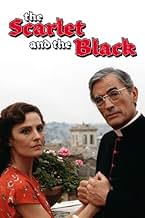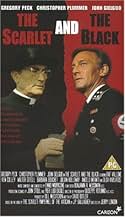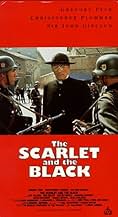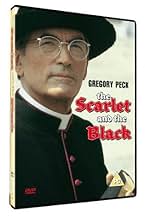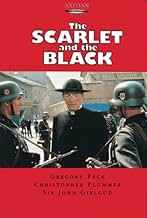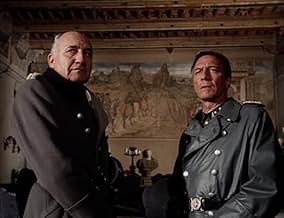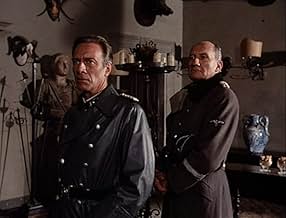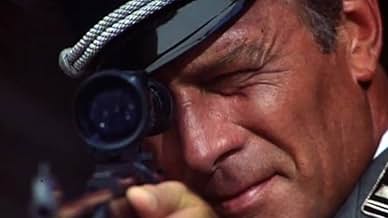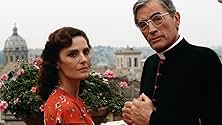1943, Le pape Pie XII ne prend pas part au conflit qui déchire l'Europe. Or Monseigneur O'Flaherty, use de son immunité diplomatique pour cacher des prisonniers de guerre. Le colonel Kappler... Tout lire1943, Le pape Pie XII ne prend pas part au conflit qui déchire l'Europe. Or Monseigneur O'Flaherty, use de son immunité diplomatique pour cacher des prisonniers de guerre. Le colonel Kappler, chef de la Gestapo de Rome, le soupçonne.1943, Le pape Pie XII ne prend pas part au conflit qui déchire l'Europe. Or Monseigneur O'Flaherty, use de son immunité diplomatique pour cacher des prisonniers de guerre. Le colonel Kappler, chef de la Gestapo de Rome, le soupçonne.
- Récompensé par 1 Primetime Emmy
- 1 victoire et 2 nominations au total
- Pope Pius XII
- (as Sir John Gielgud)
- Capt. Hirsch
- (as Ken Colley)
Histoire
Le saviez-vous
- AnecdotesWhile serving his sentence in prison, Herbert Kappler divorced his first wife and married his nurse, Anneliese, in 1972. In 1975, he was diagnosed with cancer. As the authorities refused to release him, in 1977, Anneliese carried Kappler out of prison in a large suitcase (he weighed less than one hundred five pounds at the time). They escaped to West Germany, where Kappler died six months later.
- GaffesIn at least four scenes, Herbert Kappler wears a black SS parade tunic instead of his usual office gray uniform. By 1943, when the film is set, the SS had completely phased the black SS tunic out of service and this uniform would not have been worn at even the most formal of functions.
- Citations
Col. Herbert Kappler: You're alone?
Monsignor Hugh O'Flaherty: I am.
Col. Herbert Kappler: Not afraid I'll shoot you?
Monsignor Hugh O'Flaherty: No. If you were going to kill me, your man would have already done it in my room.
Col. Herbert Kappler: That is so.
[pause]
Col. Herbert Kappler: But believe me, at this moment, nothing would give me greater pleasure.
Monsignor Hugh O'Flaherty: Well, when it comes down to it, a bullet's your answer to just about everything, isn't it? The only argument you've got.
- Versions alternativesAn edited version of approximately 110 minutes (120 minutes when broadcast with adverts) is sometimes shown on TV in the UK.
- ConnexionsReferences Représailles (1973)
- Bandes originalesLa Boheme
Composed by Giacomo Puccini
John Gielgud makes a very convincing Pope Pius XII. Sir John aged very gracefully giving him that perpetual angelic half smile on that kind face. Contrast this to the fact that we remember him well as the blackguard Casca in Julius Caesar (with James Mason and Marlon Brando). As Pius XII, Gielgud portrays the late Pope as torn between his duty to ensure the safety of the Church and Catholics and the necessity of actively participating in rescuing the Jews of Europe lest that provoke the Nazis towards more brutalities. The recently released Actes et Documents du Saint Siege relatiffs a la Guerre Mondiale Seconde (Acts and Documents of the Holy See relative to WWII or ADSS) reveal that the Holy See saw a relation between increased persecution of both Jews and Catholics, especially the religious orders, every time Pius XII spoke against the Nazis. It also disclosed that Jewish leaders, both in and out of Nazi Germany, advised the Pope to speak and act more discreetly because of this.
Gregory Peck is, as usual, dignified, likable and very convincing as a brave Catholic monsignor. An interesting political sidelight in the movie concerned Flaherty saving some British Tommies stranded behind enemy lines in Italy. One of them obviously not one fond of the Irish, upon hearing Flaherty's Celtic brogue exclaimed that he was Irish. Flaherty's response was to the effect, that he may not like what the British were doing in Ireland but it was still his Christian duty to help them. Remember, at the time Southern Ireland was still under British rule under very repressive conditions (cf. Leon Uris' book, Trinity).
If you liked movies of this genre you should also see Portrait : A Man Whose Name was John which starred Raymond Burr as the Papal Nuncio in Turkey, Msgr. Roncalli, the future Pope John XXIII who used his position and his chancery to save thousands of Jews escaping from Nazi-occupied Hungary. Other Hollywood films which treated the Church kindly if not sympathetically are: The Shoes of the Fisherman (Anthony Quinn) and The Cardinal (Tom Tryon).
Meilleurs choix
Détails
- Date de sortie
- Pays d’origine
- Langues
- Aussi connu sous le nom de
- Le pourpre et le noir
- Lieux de tournage
- Sociétés de production
- Voir plus de crédits d'entreprise sur IMDbPro
Contribuer à cette page


